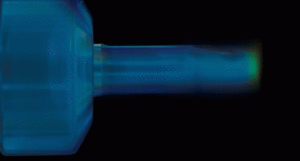- Blog
- Technical talk
- Metal chip recycling
Value-adding, future-proof and sustainable method for recycling metal chips.
Metal chips covered with traditional cooling lubricants are sooner or later only permitted for transportation as hazardous goods. If the existing provisions were already applied today, removed chips would only be allowed to have a maximum residual moisture of 1 % to not be classified as hazardous goods. The political discussion about at what point metal chips contaminated with cooling lubricant are deemed to be hazardous goods has been ongoing for a long time. In Baden-Württemberg, for example, a 0.8-% threshold virtually applies for the residual moisture. This is barely observed, however, by industry. Other German federal states are not planning such specific targets and are currently using the fuzzy term “dripping metal chips”. Why, however, is the 1 % threshold, as bindingly governed in the European directive, not enforced in the states. The fear behind this is that of burdening the metal industry, and particularly the automotive industry, with extra costs. The opposite is the case, however: technologies with lower overall costs have long since been available.
Quasi-dry machining is the biggest value-adding factor in the recycling of metal chips
There is a host of things on offer in the market to solve the problem cost intensively. There are briquette plants, chip dryers and centrifuges just for eliminating cooling lubricant residue. With all these endeavours, however, people forget that, for example, a centrifuge can only reduce the residual moisture to around 2 % in the best case. Even classic minimum quantity lubrication is not sufficient here to reach a residual moisture of below 1 %. Some attempts are being made to use highly volatile lubricants, which can have a negative effect on the climate (air purity) at the operating site. Besides biodegradable lubricants, ultimately there is only quasi-dry machining that achieves a residual moisture of below 1 %.
Overall ecological metal recovery
Admittedly: cooling lubricant residue is not the only criterion when it comes to recycling metal chips. For instance, a low as possible melting loss is also a key criterion for a high recovery of metal. The briquetting process provides some help here. However, continuous melting plants featuring the latest technology are more economical and ecological, for example those produced by Hertwich Engineering. These plants forward the chips under the bath surface into the molten mass as quickly as possible by means of induction. The loss of metal through oxidation is thus greatly reduced – a briquetting process is no longer necessary in this case.

Future-proof solution: biodegradable high-performance lubricants and quasi-dry machining
In the long term, cooling lubricants probably must be 100 % biodegradable. In this segment there are already very many and very good products on the market, but unfortunately only a minority use these considering the environment. Quasi-dry machining in turn opens up unimaginable opportunities for the whole industry: not only is it ecologically sustainable, but also increases the overall cutting performance. Unilube is consistently pursuing both objectives and is already offering both biodegradable high-performance lubricants and quasi-dry machining.
Did you like this blog article? Subscribe to our newsletter and we will provide you with the latest specialist knowledge all round quasi-dry machining every month.



